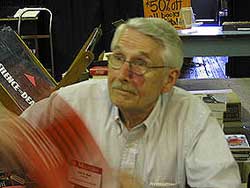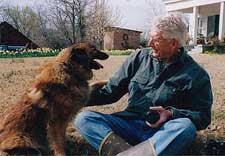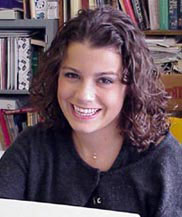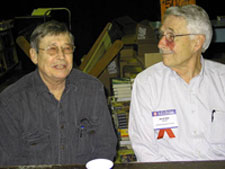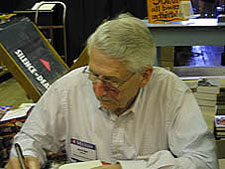Major Works
- The Hit (2003)
- Body Parts (1997)
Biography of Jere Hoar
by Luke Campbell (SHS)
Journalist, teacher, novelist, and short story writer Jere Hoar was born October 23, 1929, in Dyerburg, Tennessee, but he has lived in many places and is currently a resident of Oxford, Mississippi. The depression caused his family many hardships, and his father supported the family, which included Hoar, his mother and a brother Johnny, by selling books, advertising, and serving as a lieutenant in the Civilian Conservation Core. His father served during World War II and rose to the rank of colonel and received the Purple Heart. He then purchased the Troy Messenger, a daily newspaper in Troy, Alabama, so Jere Hoar finished high school at Troy High and helped his father with the newspaper. Hoar worked in the print shop, but by the time he was sixteen, he was the police reporter. At age seventeen, he became the editorial writer for the newspaper. In an interview with SHS student, Kim Lehman, Hoar says that it was at this point that he decided to become a journalist (Lehman).
Hoar served in the Air Force during the Korean War, earned undergraduate and graduate degrees from Auburn University, the University of Mississippi, and the University of Iowa. For thirty years, he taught journalism at the University of Mississippi and is now professor emeritus. While teaching at the University of Mississippi, Hoar won the Outstanding Teacher Award in 1974. He published more than forty scholarly articles, six monographs, three television scripts, and a chapter in a textbook. Hoar also “read law” in the Mississippi Perceptorship Program. Later, he passed the bar exam and was admitted to the Mississippi Bar.
After retiring from teaching journalism, Hoar began writing short stories. Reviews of his work have been published in the New York Times, Booklist, and Bookman News. Hoar published a collection of eleven short stories entitled Body Parts in 1997. His first published novel, The Hit is a novel. It was published in 2003. Hoar continues to live and work on his farm in Oxford.
Hoar has won many honors for both his teaching and his writing. In teaching, he won the Outstanding Teacher Award and was invited as a visiting professor at other universities, including King’s College in London, E,ns to carry out the perfect crime. The story takes place after Luke returns from the Vietnam War. The locale is a small town in rural, Northern Mississippi. Luke’s character is a complex combination of anger, greed, lust, and pain as he grieves for his lost love and plots to achieve ill-gotten gains, all complicated even more when the lost love involves him in the murder of her wealthy husband.
This book was particularly enjoyable to read because of all the twists and turns provided by Hoar’s maze-like plot. Just when the reader is sure of the next move, some event comes as a surprise. The suspenseful writing is also full of imagery and action. In many ways this book could be compared to Southern novels such as Peyton Place or the writings of Tennessee Williams. The novel involves steamy romance, an unfaithful woman with divorce almost impossible because of cultural convention, and murder as a last resort for lovers. At the same time the novel has many of the elements of a film noir movie, such as the Maltese Falcon. Creative descriptions and imagery contrast with the plot. For example, after being asked to commit a murder, Luke doesn’t dream of crime or punishment. Rather, he finds himself naked and part of a frieze in which he pursues his naked lover, who pursues a senatorial man with gold coins, who seems to be pursuing Luke. The image is at once erotic, tantalizing, and possibly foreshadowing Luke’s future.
The book is witty, fascinating, and highly readable. It is not, however, not for the young reader or the reader who may object to sex and violence. I would rate this book with five stars, but if it were a movie, I would give it an R or at least a PG-13.
Reviews
A Review of Body Parts
by Kimberly Lehman (SHS) 2000
Body Parts is a delightful collection of eleven short stories by Jere Hoar, all set in the South. Each story has its own theme and flavor. The collection has been called a “wonderful synthesis of Southern influences” (Hall) and “a winner” (Kirkus Reviews). Brett Lott observes that “Hoar’s voice is a welcome, refreshing aberration.” Each story follows a new set of characters and an interesting plot. For example, a lonely widow watches as strangers drive by her home. Finally, she encounters one of the strangers who invites her to work for him. She now must decide whether she will accept this stranger’s offer and ease her loneliness or stubbornly refuse to work as a housekeeper in Tell Me It Hasn’t Come to This.
This story has been compared to the works of Flannery O’ Connor (Kirkus Reviews). However, Hoar’s work has also been noted to reflect the writing styles or themes of such authors as Barry Hannah, Erskine Caldwell, and William Faulkner (Drury). In addition to the lonely widow’s story, other plots include the hardships that plague a young family during the Great Depression of the 1930s in My Father’s Voice, Lifting. In addition, Hoar ties in coming-of-age themes in Body Parts-A Memory of 1944, and A Brave Damn-Near Perfect Thing. Three of the main characters in A Brave Damn-Near Perfect Thing, Fergus, Cookie, and Clarke, are based on actual people, which probably explains why it is easy to relate to most of the teenage thoughts and pressures experienced through the eyes of Jeff, the main character.
This story, along with others, is so straightforward in every detail that often the reader is often surprised by the ending. Other characters, more flamboyant and unusual, are focused on in the story The Snopes Who Saved Huckaby. This story tells of Wevel Snopes, a traveling evangelist during the 1930’s, who is unable to resist sexual temptation. Through his downfall, he is able to bring new life to the small town of Huckaby. Another story Skin tells of a small, low-class, rundown town in the heated tensions of a lawn mower race. The stories express Southern culture and human nature realistically. This collection of short stories is definitely an enjoyable book to read that deserves the praise it has received from many critics.
An E-mail Interview with Jere Hoar (May 3, 2000)
by Kimberly Lehman (SHS)
Where did you grow up?
I was born in Dyersburg, TN., but moved away (with the help of my parents) when I was two. I lived many places–Barnwell, S.C., Provo, Utah, and Minersville, CA, for example, in one year. I attended thirteen schools before being graduated from high school, and lived in a far greater number of towns –most of them in the South. Because the Depression had crippled the economy, my father activated his commission when he could, and served as a lieutenant in the Civilian Conservation Corps. At other times before 1941 he sold yearbooks, sold advertising, and managed a furniture store. He was a lieutenant in the Army at Maxwell Field in Montgomery, AL, when the Japanese bombed Pearl Harbor. He volunteered that day for overseas duty, and soon shipped out to the Pacific Theatre, where he rose to the rank of Colonel and was awarded the Legion of Merit and the Purple Heart. My brother, mother and I remained in Montgomery. During WW II, I began 10th grade in Sidney Lanier High School.
Where did you attend high school? What kind of student were you?
I spent half a year in Sidney Lanier, and the remainder of my high school years at Troy High in Alabama, where my father had bought the Troy Messenger, a daily newspaper. I was an average student–a bit lost–in Sidney Lanier, but an excellent student in Troy High.
What made you become interested in journalism?
Dad was in the business and I was “forced labor.” Once I moved beyond print shop tasks and was entrusted with the job of police reporter at 16, and became the (secret) editorial writer for his newspaper at age 17, I was hooked.
What made you decide to be a professor?
I’ve always liked to learn, and teaching a subject is a way to learn it well and to organize your knowledge. Frankly, I thought I could do a better job of teaching than many of my own college professors had done! And teaching is–well, it’s a service. In some small way a teacher may contribute to others’ lives and careers. I would not like to look back, having lived my life totally for myself.
Are you currently working as an attorney?
No.
What influenced you to write Body Parts?
I had short term goals and long term. The short term goals were to free myself from the tyranny of facts, and learn a new way of writing. Fiction writing can be a search for human truth based on the writer’s vision. Fiction should either entertain or become part of our lives, or both. To learn, I chose to write different types of short stories with different points of view. The next step was to publish some of the best in a collection. Fortunately, the collection became a New York Times book of the year, and a book of the year selection of the American Library Association.
Were the characters in Body Parts based on anyone in real life?
I’m not sure what other writers do, but in my case there are only three fictional characters I can think of that are based solely on single individuals. These are Clarke, Cookie, and Fergus in the BODY PARTS story, “A Brave, Damn-Near Perfect Thing.”
Have you written any other books?
No other fiction books. I became a professional fiction writer in retirement. Before that, most of what I wrote was nonfiction. I’ve published more than 40 articles and studies in magazines and journals ranging from WESTERN HORSEMAN to THE JOURNAL OF PSYCHOLOGY; six monographs; 29 short stories in literary journals and commercial magazines; a chapter in a textbook; and many book reviews in journals and newspapers. I’ve also sold three scripts to public television.
Have you received any other awards that I do not have listed?
- The Outstanding Teacher of the Year Award at Ole Miss
- Pirate’s Alley William Faulkner Prize (co-winner)
- Kansas Arts Council/KQ Award for short fiction
- Finalist, Hemingway First Novel Contest
- The Silver Em for Contributions to Journalism
- Fulbright grant through Group Projects Abroad
- Finalist, Flannery O’Connor Competition
- Other awards in film arts, television script writing, and poetry
Are you planning on writing another book? If so, do you have a title for it yet?
Three novels are partially written. One is a thriller (Note: The Hit is now published), one is a coming-of-age novel, and one is a novel inspired by biographical anecdotes and two photographs of a grandmother I never knew. The coming-of-age novel has the working title, PREACHER BOY. The imagined life story about my grandmother will begin with a short story in BODY PARTS titled “My Father’s Voice, Lifting.” It will follow the heroine from girlhood to old womanhood.
Do you have any favorite hobbies?
Yes, I do! I read novels, story collections and nonfiction books, hunt quail and raise bird dogs, ride Tennessee Walking Horses, have a flock of St. Croix sheep, train my herding dog and compete with her, and study subjects that interest me. Right now, that subject is genetics.
Do you have any family you would like to mention?
My daughter, Lu Ann, is the supervisor of group homes for the retarded in North Mississippi. My elder son, Tom, is a director of public relations. Ben, a former dentist, is becoming a missionary. All have received undergraduate and graduate degrees from Ole Miss.
Is there any other information you would like to share that I have not already asked?
I’d like young people to know that a life in the arts is not one that most writers, musicians, painters, and so-on are born to! The major difference between a published writer and a non published one is that the former is persistent and a learner. As a teacher with 36 years of experience, I promise you that there are more talents and abilities in you and your classmates than you will ever develop fully. Some are great talents, and some are lesser, but we are all potentially inventive and multi-talented individuals. How we our spend time in our preparatory years is important. Every choice matters. My brother, Johnny, and I were fortunate as boys. Our mother, who had little experience in the world, convinced us that we could achieve whatever we wanted if we wanted it enough, would prepare ourselves, and would work hard and persistently. We were small and ignorant, had no experience in the world, and believed her. That has served us well.
*One more point: it helps to set both short term and long term goals, so that you are rewarded and encouraged at each stage in your journey.
Related Websites
- Robert L. Hall interviews Jere Hoar for Southern Scribe.
- Murder with Southern Hospitality exhibit at Ole Miss features Hoar.
- Brief information about Hoar is available here.
Bibliography
- Castellitto, Linda M. “Jere Hoar.” December 10, 2003. <http://www.booksense.com/people/archive/h/hoarjere.jsp>.
- “Jere Hoar.” University of Mississippi. December 9, 2003. <http://www.olemiss.edu/mwp/dir/hoar_jere/index.html>.
- Padgett, John B. Body Parts. University of Mississippi. September 1, 1997. <http://www.olemiss.edu/depts/english/ms-writers/books/1997/october.html>.
- Lehman, Kim. Interview with Jere Hoar. May 3, 2000.
- Hoar, Jere. The Hit. Context Books: Washington D.C., 2003.

